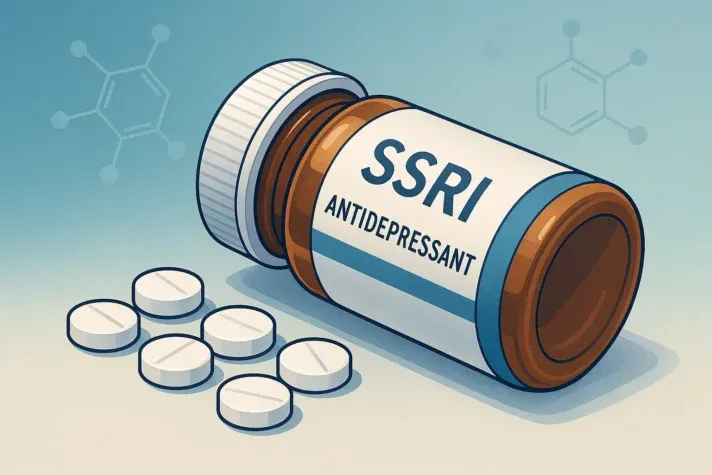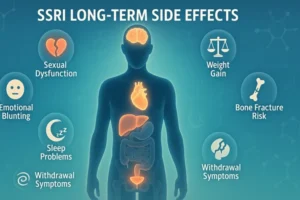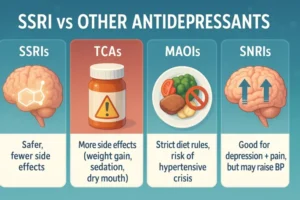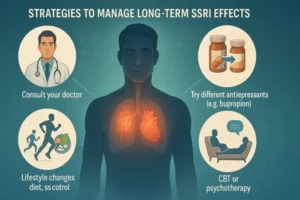SSRIs and Erectile Dysfunction: Depression Medications That May Affect Performance
Written by Dr. Sharon Kumar

With a strong academic background in dentistry and clinical exposure, Dr. Sharon who has studied at PDM Dental College, brings a valuable blend of medical knowledge and communication skills to health content writing. She is passionate about creating clear, compassionate, and evidence-based content on topics such as general wellness, sexual health, oral care, and patient education. Her goal is to make complex medical information easy to understand, relatable, and genuinely helpful for readers seeking clarity on their health concerns. Dr. Sharon believes in the power of well-researched, empathetic content to educate and empower people to make better health decisions. Whether it’s writing about preventive care or breaking down myths in sexual wellness, her content always balances science with sensitivity.
•
September 15, 2025
Our experts continually monitor the health and wellness space, and we update our articles when new information becomes available.

Quick Read
SSRIs can cause several long-term side effects, including sexual dysfunction, emotional blunting, weight gain, sleep disturbances, bone fracture risk, gastrointestinal issues, withdrawal symptoms, and mild cognitive changes. Among these, SSRI-induced sexual dysfunction, such as erectile dysfunction, low libido, and delayed orgasm, is one of the most common and concerning problems. The reason SSRIs cause erectile dysfunction is that higher serotonin levels interfere with dopamine and norepinephrine, two key brain chemicals needed for arousal and erections. For most people, sexual side effects improve after stopping the medication, but in some rare cases, SSRI erectile dysfunction may last longer. Overall, while SSRIs are generally safe, long-term use can sometimes lead to persistent side effects, which is why regular doctor consultations, healthy lifestyle changes, and in some cases switching medications are important for safe and effective treatment.
Selective serotonin reuptake inhibitors (SSRIs) are among the most prescribed antidepressants worldwide. These medications work by increasing a certain chemical in the brain (serotonin levels). This helps to increase the symptoms of depression, anxiety, and other mental health conditions. While SSRIs have proven effective for many, long-term use can lead to a range of side effects, including sexual dysfunction, emotional detachment, and cognitive issues[1]. Among the most concerning and common long-term side effects is erectile dysfunction (ED), which affects a significant number of individuals on SSRIs. In this article, we’ll explore SSRIs and erectile dysfunction, why this side effect occurs, and the potential long-term effects of SSRI use. We’ll also examine the differences between SSRIs and other antidepressants, along with practical advice on managing side effects, including ED.
Allo asks
Have You Experienced Side Effects from SSRIs?
SSRIs and Erectile Dysfunction: Why It Happens
Erectile dysfunction (ED) is a commonly reported side effect for many people taking SSRIs. The reason SSRIs cause ED is linked to how these medications alter the levels of a brain chemical (serotonin)in the brain. While the brain chemical called serotonin [2] helps regulate mood, it also plays a role in sexual arousal and function. An increase in serotonin can stop the release of other chemicals in the brain and nerves (neurotransmitters). These neurotransmitters are dopamine[3] and norepinephrine[4], which are very important for sexual function. This disturbance in the imbalance of neurotransmitters can lead to:
- Reduced sexual desire or libido: Decreased sexual desire or interest.
- Difficulty achieving or maintaining an erection: A common symptom of ED.
- Delayed orgasm or inability to reach orgasm: Another frequent complaint among those taking SSRIs.
“Many of my patients worry about long-term side effects like erectile dysfunction. With the right medical guidance, adjustments, or alternative treatments, these issues can often be improved.” These issues can persist even after stopping the medication, leading to concerns about permanent erectile dysfunction.

SSRI Long-Term Side Effects
While sexual dysfunction is one of the most common long-term side effects, SSRIs can also lead to other health problems when taken over longer periods of time. Here's a breakdown of the long-term side effects:
1. Sexual Dysfunction
- Sexual dysfunction, including erectile dysfunction, is one of the most prevalent and long-lasting side effects of SSRIs.
- The effect may reduce after stopping the medication, but in some cases, it may continue post-treatment.
2. Emotional Blunting
- Emotional blunting [5] refers to feeling numb or disconnected from both positive and negative emotions.
- Some individuals report feeling less joy or sadness, which can negatively affect relationships and overall quality of life.
3. Weight Gain
- Over time, some people experience weight gain when using SSRIs.
- This may be due to changes in appetite or metabolism, or an increased tendency to retain fat.
4. Sleep Disturbances
- SSRIs can affect sleep patterns, leading to insomnia [6] ( no sleep) or excessive sleepiness, both of which are problematic for overall health.
- These issues may worsen with long-term use.
5. Increased Risk of Bone Fractures
- Studies suggest that regular use of SSRIs might be linked to a higher risk of bone fractures, particularly in older adults [7].
- This risk arises because SSRIs can affect bone density, making bones more fragile or prone to cracking.
6. Gastrointestinal Issues
- When people start taking SSRIs, they may get stomach problems like nausea[8], diarrhea [9], or constipation [10].
- For some, these issues go away after a while, but for others, they can last longer.
7. Withdrawal Symptoms (Discontinuation Syndrome)
- When discontinuing SSRIs suddenly, patients may experience withdrawal symptoms like dizziness, nausea, irritability, and flu-like symptoms.
- This is why gradual tapering is highly recommended.
8. Cognitive Effects
- Mild cognitive issues such as memory problems or difficulty concentrating are possible long-term effects of SSRIs.
- These tend to be reversible once the medication is discontinued.
9. Emotional or Behavioral Changes
In rare cases, SSRI use can lead to increased irritability, aggression, or even suicidal thoughts during the early stages of treatment or dose adjustments.
10. Serotonin Syndrome
- Serotonin syndrome [11] is a life-threatening condition that occurs when there is an excess of serotonin in the brain, often caused by drug interactions or an overdose.
- Symptoms include agitation (feeling unusually restless), hallucinations, fever, and muscle rigidity.

SSRI vs Other Antidepressants: Key Differences
While SSRIs are effective for treating depression, they are not the only class of antidepressants. Understanding the differences between SSRIs and other antidepressant types can help individuals make informed decisions about their treatment options.
SSRIs vs. Tricyclic Antidepressants (TCAs)
- SSRIs are often preferred over tricyclic antidepressants (TCAs) due to their more favorable side effect profile.
- TCAs are effective, but they have a higher risk of side effects, including weight gain, sedation, and anticholinergic effects like dry mouth and blurred vision.
SSRIs vs. MAOIs
- Monoamine oxidase inhibitors (MAOIs) [12] are another class of antidepressants that are often prescribed when SSRIs and other drugs are ineffective.
- MAOIs have a stricter dietary restriction (due to potential food-drug interactions) and a higher risk of severe side effects, such as hypertensive crises.
SSRIs vs. SNRIs
- Serotonin-norepinephrine reuptake inhibitors (SNRIs)[13], like Venlafaxine (Effexor), work by increasing brain chemical levels (serotonin and norepinephrine).
- SNRIs may be a better option for individuals who do not respond well to SSRIs.
- They can also be effective in treating conditions like anxiety and pain disorders, but they come with their own set of side effects, including nausea, dizziness, and increased blood pressure.

How to Manage Long-Term Side Effects of SSRIs
If you’re concerned about erectile dysfunction or other long-term side effects, there are several ways to manage them:
1. Consult with your doctor
If you experience ED or other troubling side effects, your doctor may adjust your medication or dosage.
2. Switch medications
If SSRIs are causing significant sexual dysfunction, consider switching to a different antidepressant that may be less likely to cause these issues, such as bupropion.
3. Lifestyle changes
Lifestyle changes, including regular exercise, a balanced diet, and stress-reduction techniques, may reduce some of the side effects associated with SSRIs.
4. Therapy
Cognitive behavioral therapy (CBT) or other forms of psychotherapy can help address both depression and any emotional blunting caused by SSRIs.

Conclusion
SSRIs are effective antidepressants, but long-term use can sometimes bring side effects such as sexual dysfunction, emotional changes, and sleep or digestive issues. If you notice troubling symptoms like erectile dysfunction, don’t ignore them; talk to your doctor. With the right guidance, lifestyle changes, or alternative treatments, it’s possible to manage these side effects while still getting the mental health support you need.
Disclaimer
The following blog article provides general information and insights on various topics. However, it is important to note that the information presented is not intended as professional advice in any specific field or area. The content of this blog is for general educational and informational purposes only. The content should not be interpreted as endorsement, recommendation, or guarantee of any product, service, or information mentioned. Readers are solely responsible for the decisions and actions they take based on the information provided in this blog. It is essential to exercise individual judgment, critical thinking, and personal responsibility when applying or implementing any information or suggestions discussed in the blog.
Most Asked Questions
Can therapy help with SSRI-related side effects?
Yes, therapies like cognitive behavioral therapy (CBT) can help manage emotional blunting, anxiety, and relationship strain linked to SSRI side effects.
What is serotonin syndrome, and should I be worried?
Serotonin syndrome is rare but serious. It happens when serotonin levels become dangerously high (often from drug interactions). Symptoms include restlessness, fever, muscle rigidity, or confusion. Immediate medical attention is required.
Do all SSRIs have the same risk of causing ED?
Not exactly. While most SSRIs carry some risk, the severity may differ depending on the specific medication, dose, and individual biology.
Can lifestyle changes really help reduce SSRI side effects?
Yes. Regular exercise, a balanced diet, good sleep, and stress reduction can make a noticeable difference in managing fatigue, weight gain, and even mild sexual issues.
Is it safe to stop SSRIs suddenly to fix ED?
No. Stopping suddenly can trigger withdrawal symptoms. Always taper under medical guidance if considering a change.
Sources
- 1.
Cognitive Symptoms
- 2.
Physiology, Serotonin
- 3.
Dopamine: The pathway to pleasure
- 4.
Norepinephrine
- 5.
Emotional Blunting in Patients With Major Depressive Disorder: A Brief Non-systematic Review of Current Research
- 6.
Insomnia
- 7.
Antidepressant use and 10-year incident fracture risk: the population-based Canadian Multicentre Osteoporosis Study (CaMoS)
- 8.
Nausea & Vomiting
- 9.
Diarrhea
- 10.
Constipation
- 11.
Serotonin syndrome
- 12.
Monoamine Oxidase Inhibitors (MAOI)
- 13.
Serotonin and norepinephrine reuptake inhibitors (SNRIs) Print


